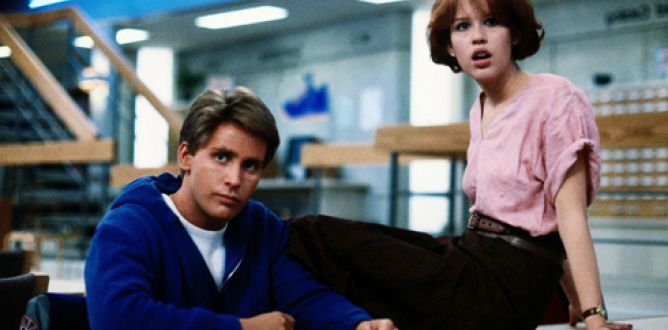The Breakfast Club Parent Guide
Strange things happen to five students who attend Saturday morning detention.
Parent Movie Review
What do you get when you combine a Brain, an Athlete, a Princess, a Criminal and a Basket Case? You get the characters of The Breakfast Club—the popular 1985 teen-angst film, written and directed by John Hughes.
The script brings five stereotypical high school students together to serve a detention on a cloudy Saturday morning in March. Although these diverse kids are aware of each other’s existence, none are friends. All they really know about one another is what clique they belong to: Polite and people-pleasing Brian Johnson (Anthony Michael Hall) pulls grades that keep his name on the honor roll. The muscular Andrew Clark (Emilio Estevez) has the promise of being a star wrester, just like his monogrammed jacket advertises. Beautiful and stylish Clair Standish (Molly Ringwald) is the girl most likely to be voted prom queen. Her antithesis, John Bender (Judd Nelson) is insolent, scruffy, and a good candidate to be incarcerated for illegal possession. And then there’s the easily overlooked Allison Reynolds (Ally Sheedy) who is so crazy and reclusive that she doesn’t even bother to talk—although she sometimes grunts.
Starting at 7 AM, the group meets in the library to await their punishment from Mr. Vernon (Paul Gleason), which turns out to be a thousand-word-essay about “who they think they are.” This exercise in self-reflection also comes with the command not to talk, sleep, or move from their seats until they have finished the full term of their sentence at 4 PM.
The rules are entirely unreasonable, a fact even the autocratic Vernon realizes, but he evokes the strict conditions anyway, assuming they will keep the students under control while he sort of supervises them from his office across the hall. Bender, of course, immediately challenges his authority, which results in a one-upping war of insults and threats. When Vernon (uncertain of his victory) finally does leave them to govern themselves, the hostile Bender turns his bad attitude on his fellow felons, with a litany of foul language, sexual comments and physical violence. (At one point he even pulls out a switchblade, but no injuries occur). Like the angry administrator, the teens fire back with their own profanities, finger gestures and nasty remarks.
These tensions make for a long morning (and a tedious sit for the audience), however the pace picks up around lunch hour when the crew takes fieldtrips (some sanctioned and others not) around the campus. On one of theses excursions, Bender retrieves a bag of drugs from his locker. Once it is smuggled back to the library, a few of the kids smoke joints. Perhaps the marijuana is the catalyst that finally gets the teens talking to each other (the plot doesn’t really offer a better explanation).
During the lengthy conversation that ensues, each of the characters opens up and shares the trials and sorrows of their personal lives. The greatest secret to be reveled is that they have more in common than any of them thought. Whether popular or outcast, rich or poor, talented or challenged, all of them have experienced disappointments, problems with parents and self-esteem issues. Seeing each other stripped of the labels they have been using to hide behind, the teens suddenly have a different perspective of who they really are. They also have a new name to describe one another—friends.
It is this message that has kept people coming back to The Breakfast Club, and turned the film into a classic movie. And while it is a worthy theme, viewers should be aware that in order get there they will have to endure frequent sexual expletives, pervasive profanities, crass sexual discussions, crude slang terms, glamorized rebellious behavior, illegal drug use by minors, as well as references to suicide, physical abuse and alcoholism. It’s a list so lengthy that it might feel as long as the students’ nine-hour detention.
Directed by John Hughes. Starring Emilio Estevez, Judd Nelson, Molly Ringwald, Ally Sheedy, Anthony Michael Hall. Running time: 97 minutes. Theatrical release February 15, 1995. Updated January 2, 2018
The Breakfast Club
Rating & Content Info
Why is The Breakfast Club rated R? The Breakfast Club is rated R by the MPAA
Violence: Students are disrespectful of authority figures. A school principal locks a student in a storage room and makes verbal threats to physically harm the student. Blackmail is alluded to. Students cause property damage. One student wrestles another to the floor. A teen pulls out a switchblade during a physical altercation, but it is never used. A teen talks of physical abuse, as a punishment from a parent and between spouses. A character falls through a false ceiling and onto the floor. A character steals objects and says she is a compulsive liar. A character confesses to feelings of suicide.
Sexual Content: A character threatens to urinate on the floor, and undoes the zipper of his pants. Crass sexual references and discussions are frequent, and sometimes used to embarrass or humiliate other students. Characters question others about their sexual experiences, including teasing them for being a virgin, and bullying them to reveal details of their private life. A teen girl confesses to having sexual relations with an authority figure, as well as paying for sex—but it is unclear if her claims are true. Feminine hygiene supplies are seen when a character dumps out the content of her purse. Teen couples kiss.
Language: Pervasive use of mild, moderate and extreme profanities, including scatological slang and terms of deity used as exclamations. Frequent use of the sexual expletive and a couple of crude hand gestures, along with plentiful crass terms for sex and body parts. Derogatory sexual slurs, insults about body size, and name-calling are heard.
Alcohol / Drug Use: Teenaged characters smoke tobacco and marijuana cigarettes.Alcoholism is mentioned.
Page last updated January 2, 2018
The Breakfast Club Parents' Guide
Talk about the movie with your family…
What do you think this movie is trying to say when it begins with a quote from musician David Bowie:
“And these children
That you spit on
As they try to change their worlds
Are immune to your consultations.
They’re quite aware
Of what they’re going through.
Writer and director John Hughes has been lauded for this movie’s portrayal of teen issues. How do you feel about the serious way he depicts the various characters’ problems. Do you relate to any of them? Does he offer any hope for other teens facing such issues? Why is there no mention of getting help from adults? How are the adult characters portrayed in this movie?
As the students come to better understand each other, they start to have feelings of empathy for one another. Do you think they will remain friends? Do you think that such support could change the behavior of someone like Bender? How might Bender’s comfort with illegal activities affect the others?
Each of the students identifies with a certain clique. Why? Do these groups help or hinder them? How do expectations from peers and parents impact the decisions these teens are making? Do you also feel that pressure?
Have you ever wondered where The Breakfast Club is now? Check here:
Home Video
The most recent home video release of The Breakfast Club movie is January 2, 2018. Here are some details…
Home Video Notes: The Breakfast Club
Release Date: 2 January 2018
Criterion releases The Breakfast Club on home video (Blu-ray) with the following extras:
- Audio commentary from 2015 featuring actors Anthony Michael Hall and Judd Nelson
- New interviews with actors Molly Ringwald and Ally Sheedy
- New video essay featuring director John Hughes’s production notes, read by Nelson
- Documentary from 2015 featuring interviews with cast and crew
- 50 minutes of never-before-seen deleted and extended scenes
- Rare promotional and archival interviews and footage
- Excerpts from a 1985 American Film Institute seminar with Hughes
1999 radio interview with Hughes
- Segment from a 1985 episode of NBC’s Today show featuring the film’s cast
- Audio interview with Molly Ringwald from a 2014 episode of This American Life
- Trailer
- PLUS: An essay by critic David Kamp
Home Video Notes: The Breakfast Club: 30th Anniversary Edition
Release Date: 10 March 2015
The Breakfast Club releases in a 30th Anniversary Edition to home video (Blu-ray/Digital Copy/UltraViolet). The movie has been “Digitally Remastered and Fully Restored From 35mm Original Film Elements, ” and comes with the following bonus features:
- Accepting the Facts: The Breakfast Club Trivia Track
- Sincerely Yours
- The Most Convenient Definitions: The Origins of The Brat Pack
- Theatrical Trailer
- Feature Commentary with Anthony Michael Hall and Judd Nelson
Related home video titles:
Two outcast teens become a support to each other in the movie The Mighty. Another group of students breakdown stereotypes in the family-friendly movie High School Musical.


